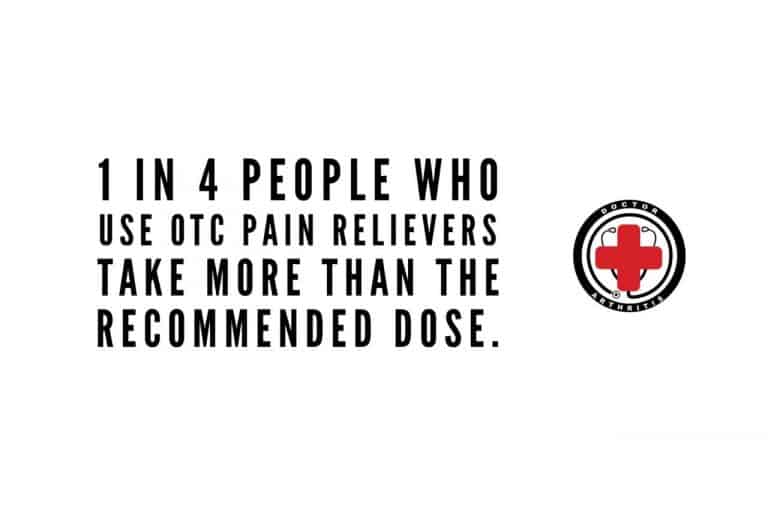With over 1 million orders

Avoid These Common OTC Painkiller Mistakes
Managing arthritis symptoms usually mean you depend on a lot of over-the-counter (OTC) remedies, including painkillers. We’ve all taken them so many times that it’s hard to imagine we can still make mistakes when it comes to popping a Tylenol or Aleve.
Turns out however it’s not as straightforward as you think. In fact, there are quite a few things that we get wrong when it comes to taking our go-to OTC medicine. Keep on reading—you’ll be surprised to find out that even you might be making them…
IMPORTANT: Be sure to consult and inform your doctor or healthcare provider what OTC medicine you plan to take.
1. Taking the wrong OTC medicine
It’s easy to purchase OTC medications. In fact, you actually have pretty extensive options to choose from. Given that, it’s not uncommon for chronic pain sufferers to simply select whatever is available at home to help soothe their pain.
Not all painkillers address the same issues however. For example, while taking ibuprofen or aspirin for sciatica may help with mild or occasional pain, it’s simply not strong enough to manage nerve pain.
If you find that OTC medications aren’t doing their job, speak to your healthcare professional about it. They should be able to prescribe something that will provide better relief.
2. Not reading the label warnings
Because they’re available OTC, we tend to take the safety of these medications for granted. However, we strongly advise that you closely read these label warnings. This is where you can find important information about allergic reactions as well as drug or alcohol interactions. It let’s you know basically whether the drug is actually safe for you to take.
Be sure to regularly check labels too. Medication label warnings are sometimes updated. And it’s important to keep reviewing the information, especially if you were just given a new diagnosis or you were given new medication.
3. Not following dosage instructions
OTC medications often come with clear dosage guidelines. But while you may already know that you should never take too much, you should note that taking too small a dose is equally ineffective.
If you were advised to take two, don’t just take one. Dosage for OTC medication is based on multiple factors such as your weight or how quickly the drug takes effect. Again, it’s important that you speak to a doctor or medical professional about this. And be sure to ask for specific instructions on top of dosage, such as frequency; and what to do if the pain doesn’t go away.
4. Not eating before drinking OTC medication
A lot of OTC medications warn that you should take the drug with food. When you don’t, you end up with unexpected side effects such as a stomachache and in rare cases even stomach ulcers.
If the warning label indicates that the medicine be taken on a full stomach, make sure that you follow it. Moving forward, try pairing dosage with your meals so you never have to worry about taking it on an empty stomach.
5. Taking OTC medication in the wrong form
Keep these in mind—liquid and liquid-gels help relieve pain faster because they are digested faster and absorbed quicker into the bloodstream. But this means that its effects could be faster as well. Alternative fast-acting options are chewable as well as rapid-release tablets. Capsules, hard tablets, and caplets, while equally effective, usually take longer to take effect.
To find out what is best for you and your needs, discuss this with your doctor, healthcare professional, or pharmacist.
Finally, (and this almost goes without saying), don’t ignore the expiration date. Past the indicated expiration date, the drug will start to break down and the maker can no longer guarantee safety or efficacy. If your go-to bottle is past it expiration date, throw it away.
If symptoms persist, you can also try applying a hot or cold compress to help reduce inflammation or using a compression sleeve to help provide support and facilitate better blood flow.
If you have any questions, feel free to leave a message below or join our Facebook community and start a conversation.
